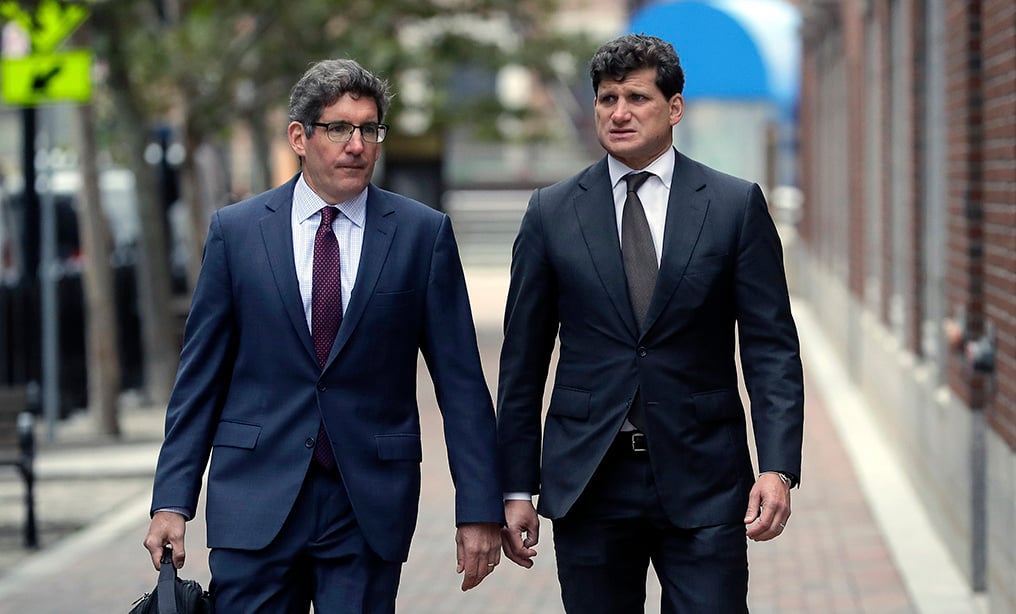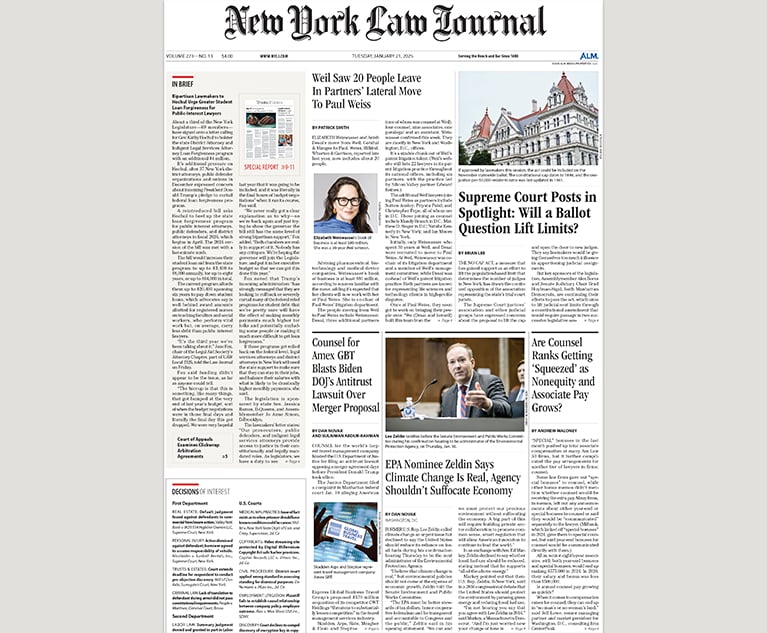Ex-Willkie Co-Chair Gordon Caplan Gets Prison Term in College Admissions Case
Caplan, whose lawyers had asked a federal judge to spare him any time behind bars, will serve one month in prison.
October 03, 2019 at 12:54 PM
7 minute read
 Gordon Caplan, right, joined by his attorney Joshua Levy of Ropes & Gray, arrives at federal court in Boston on Thursday, Oct. 3, for sentencing in a nationwide college admissions bribery scandal. Photo: Steven Senne/AP
Gordon Caplan, right, joined by his attorney Joshua Levy of Ropes & Gray, arrives at federal court in Boston on Thursday, Oct. 3, for sentencing in a nationwide college admissions bribery scandal. Photo: Steven Senne/AP
Gordon Caplan, the former co-chairman of Willkie, Farr & Gallagher, was sentenced to one month in federal prison Thursday for paying a college admissions consultant to rig his daughter's ACT score.
U.S. District Judge Indira Talwani of the District of Massachusetts said the interests of general deterrence drove the need for Caplan to serve time behind bars. The sentence was below the eight months prosecutors asked for, but dashed Caplan's hopes for a noncustodial sentence.
He was ordered to report to prison Nov. 6. In addition to the prison time, Talwani ordered Caplan to pay a $50,000 fine and to serve one year of supervised release. His sentence also includes community service.
The sentence is another notch in the belt for U.S. Attorney Andrew Lelling's office, which brought cases against some 50 defendants as part of its probe into a web of corrupt college admissions officials centered on William Rick Singer, dubbed "Operation Varsity Blues." Many other defendants pleaded guilty and await sentencing.
The government, whose prosecution team included multiple Big Law alumni, said Caplan had shown "callous disregard for honesty and the rule of law."
Caplan is at least the fourth parent in the college admissions case to be sentenced to prison time; Felicity Huffman, the actress, was sentenced to two weeks after she pleaded guilty to working with Singer to rig her daughter's SAT score. Parents Devin Sloane and Stephen Semprevivo—who worked with Singer to fraudulently pass their kids off as talented athletes—each got four months.
John Vandemoer, a coach accused of accepting funds for the Stanford sailing program in exchange for a willingness to tell the school's admissions office that phony athletes referred by Singer were prized recruits, received a sentence of no prison time.
Caplan's lawyers at Ropes & Gray and Smith Villazor argued that Caplan's public humiliation and his possible disbarment would be enough punishment, and said a prison term would harm his family. If anything, they argued, he should face no harsher a penalty than Huffman, who went so far as to consider making use of Singer's illegal services for a second child.
Prosecutors sought to rebut that argument, however. Assistant U.S. Attorney Eric Rosen argued that Caplan's status as a lawyer, the fact that he hired another attorney who was oblivious to the cheating to threaten the ACT after it withheld his daughter's test score and the fact that he paid $75,000 for Singer's test-rigging services—five times what Huffman did—made clear that he was the worse offender.
But Talwani split with prosecutors over whether the price Caplan paid meant his crime was any worse than Huffman's. Caplan's plea agreement included an upward adjustment to the guidelines based on that sum, but the judge rejected that reasoning in her assessment of the guidelines—the total offense level should be five, not 11, as it was in the plea deal, she said.
Still, the judge cited the high price tag Caplan paid in other parts of her analysis. What drove her decision to impose a prison sentence, she said, was the need for general deterrence, plus the huge amount of money involved.
"This is large money, which makes it more of a serious issue," the judge said. "It's just different than most [crimes with a guidelines range of zero to six months in prison]."
Talwani made clear that she didn't agree with prosecutors about Caplan's status as a prominent lawyer figuring into his crime or punishment. "I don't see how this offense was trading on his position as a lawyer," she said.
As to further consequences Caplan may suffer to his already-derailed career, the judge invoked "a combination of having a punishment here and the court's recognition that you have fully accepted responsibility here and, in my view, are more likely to understand the morality and rules and law going forward than before this conviction.
"So I don't know what will happen with the collateral consequences, but … hopefully the punishment will weigh against further consequences," she continued.
'The Moral Issue'
The sentence marks the end of a relatively straightforward and short criminal case. Caplan was among dozens of parents charged in March with paying corrupt consultant Singer to help their children get into good schools. Within less than a month, he announced his intent to plead guilty.
The legal strength of the case against Caplan will never be litigated, but prosecutors said his recorded conversations with Singer were damning.
"To be honest, I'm not worried about the moral issue here," he was quoted as saying. "I'm worried about the, if [my daughter] is caught doing that, you know, she's finished."
Talwani took a few minutes at Caplan's sentencing to chastise prosecutors for their use of the wiretapped and recorded calls between Singer and his clients. She suggested that it gave prosecutors a leg-up in the court of public opinion, saying, for instance, that Caplan didn't have access to any parts of the transcript where he refused to take Singer up on his offers of other illegal conduct.
When Rosen acknowledged that full transcripts weren't being provided to Varsity Blues defendants that pleaded guilty, the judge ordered that the prosecution provide them to any such defendants who request them.
It's not known what Caplan will do once he finishes his stint in prison. He resigned from Willkie and has agreed to be suspended from the bar, his lawyers wrote in a sentencing memo last week. While he is still listed in the New York attorney directory, lawyers convicted of conduct that would amount to a felony under New York law are automatically disbarred in the state. It's not known whether Caplan will seek to defend his law license; such proceedings are not public.
Willkie, for its part, appears to have continued to prosper since Caplan's departure. It has added 10 partners, and lost five others, since March, the month of Caplan's arrest, according to ALM Intelligence data, with notable growth in its London and Bay Area offices.
Steven Gartner, the firm's chairman, was among several prominent lawyers to ask for leniency on Caplan's behalf. He said Caplan was an excellent lawyer, and in the wake of his arrest, his clients contacted the firm and "were, without exception, extremely appreciative of Gordon's commitment to them and genuinely concerned about his personal and family's well-being."
Read More
'I Was Genuinely Shocked': Lawyers at Willkie and Other Firms Urge Leniency for Caplan
Ex-Willkie Co-Chair Gordon Caplan Asks Judge to Spare Him Prison
Ex-Willkie Co-Chairman Gordon Caplan Pleads Guilty To Conspiracy
This content has been archived. It is available through our partners, LexisNexis® and Bloomberg Law.
To view this content, please continue to their sites.
Not a Lexis Subscriber?
Subscribe Now
Not a Bloomberg Law Subscriber?
Subscribe Now
NOT FOR REPRINT
© 2025 ALM Global, LLC, All Rights Reserved. Request academic re-use from www.copyright.com. All other uses, submit a request to [email protected]. For more information visit Asset & Logo Licensing.
You Might Like
View All
Neighboring States Have Either Passed or Proposed Climate Superfund Laws—Is Pennsylvania Next?
7 minute read
Trending Stories
- 15th Circuit Considers Challenge to Louisiana's Ten Commandments Law
- 2Crocs Accused of Padding Revenue With Channel-Stuffing HEYDUDE Shoes
- 3E-discovery Practitioners Are Racing to Adapt to Social Media’s Evolving Landscape
- 4The Law Firm Disrupted: For Office Policies, Big Law Has Its Ear to the Market, Not to Trump
- 5FTC Finalizes Child Online Privacy Rule Updates, But Ferguson Eyes Further Changes
Who Got The Work
J. Brugh Lower of Gibbons has entered an appearance for industrial equipment supplier Devco Corporation in a pending trademark infringement lawsuit. The suit, accusing the defendant of selling knock-off Graco products, was filed Dec. 18 in New Jersey District Court by Rivkin Radler on behalf of Graco Inc. and Graco Minnesota. The case, assigned to U.S. District Judge Zahid N. Quraishi, is 3:24-cv-11294, Graco Inc. et al v. Devco Corporation.
Who Got The Work
Rebecca Maller-Stein and Kent A. Yalowitz of Arnold & Porter Kaye Scholer have entered their appearances for Hanaco Venture Capital and its executives, Lior Prosor and David Frankel, in a pending securities lawsuit. The action, filed on Dec. 24 in New York Southern District Court by Zell, Aron & Co. on behalf of Goldeneye Advisors, accuses the defendants of negligently and fraudulently managing the plaintiff's $1 million investment. The case, assigned to U.S. District Judge Vernon S. Broderick, is 1:24-cv-09918, Goldeneye Advisors, LLC v. Hanaco Venture Capital, Ltd. et al.
Who Got The Work
Attorneys from A&O Shearman has stepped in as defense counsel for Toronto-Dominion Bank and other defendants in a pending securities class action. The suit, filed Dec. 11 in New York Southern District Court by Bleichmar Fonti & Auld, accuses the defendants of concealing the bank's 'pervasive' deficiencies in regards to its compliance with the Bank Secrecy Act and the quality of its anti-money laundering controls. The case, assigned to U.S. District Judge Arun Subramanian, is 1:24-cv-09445, Gonzalez v. The Toronto-Dominion Bank et al.
Who Got The Work
Crown Castle International, a Pennsylvania company providing shared communications infrastructure, has turned to Luke D. Wolf of Gordon Rees Scully Mansukhani to fend off a pending breach-of-contract lawsuit. The court action, filed Nov. 25 in Michigan Eastern District Court by Hooper Hathaway PC on behalf of The Town Residences LLC, accuses Crown Castle of failing to transfer approximately $30,000 in utility payments from T-Mobile in breach of a roof-top lease and assignment agreement. The case, assigned to U.S. District Judge Susan K. Declercq, is 2:24-cv-13131, The Town Residences LLC v. T-Mobile US, Inc. et al.
Who Got The Work
Wilfred P. Coronato and Daniel M. Schwartz of McCarter & English have stepped in as defense counsel to Electrolux Home Products Inc. in a pending product liability lawsuit. The court action, filed Nov. 26 in New York Eastern District Court by Poulos Lopiccolo PC and Nagel Rice LLP on behalf of David Stern, alleges that the defendant's refrigerators’ drawers and shelving repeatedly break and fall apart within months after purchase. The case, assigned to U.S. District Judge Joan M. Azrack, is 2:24-cv-08204, Stern v. Electrolux Home Products, Inc.
Featured Firms
Law Offices of Gary Martin Hays & Associates, P.C.
(470) 294-1674
Law Offices of Mark E. Salomone
(857) 444-6468
Smith & Hassler
(713) 739-1250








